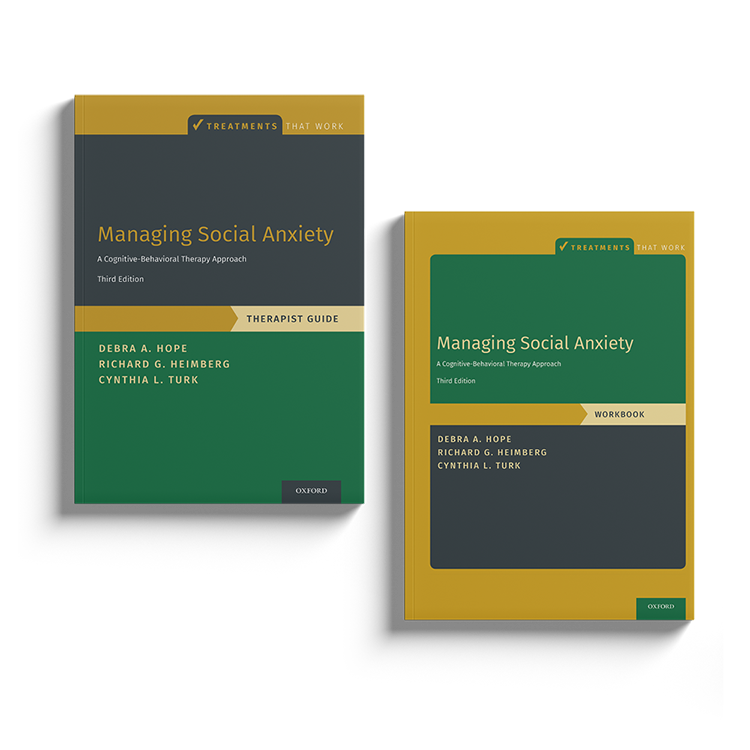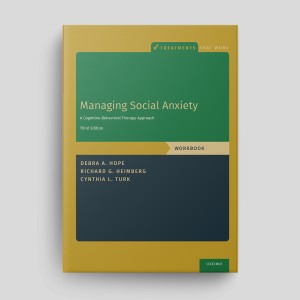Managing Social Anxiety (Third Edition): Therapist Guide
The Managing Social Anxiety program provides step-by-step instructions and evidence-based strategies for supporting individuals struggling with social anxiety. A client workbook is downloadable separately.

Download or send

Overview
Cognitive behavioral therapy (CBT) is an effective treatment for social anxiety. It is recommended by the National Institute for Health and Care Excellence (NICE, 2013). The Managing Social Anxiety: Therapist Guide (Third Edition) is written by Debra A. Hope, Richard G. Heimberg, and Cynthia L. Turk, and provides therapists with all the tools they need to deliver effective, evidence-based psychological treatment for social anxiety. Part of the Treatments That Work™ series, the step-by-step approach is easy for beginning therapists to implement and offers many practical recommendations to help clients successfully engage with the treatment.
Why Use This Resource?
This program provides a step-by-step, structured approach for treating social anxiety disorder. It includes:
- Detailed explanations of cognitive-behavioral principles tailored to social anxiety.
- Evidence-based interventions for overcoming social anxiety.
- Practical guidance for structuring sessions and implementing client exercises.
- Strategies for overcoming common obstacles during treatment.
Key Benefits
Structured
Educational
Effective
Trusted
Who is this for?
Social Anxiety disorder (SAD)
Persistent fear of social situations due to concerns about embarrassment, judgment, or scrutiny.
Integrating it into your practice
Assessment
Explore how clients experience social anxiety.
Psychoeducation
Teach clients about social anxiety and what maintains it.
Skills
Implement effective cognitive-behavioral interventions to address key symptoms.
Monitoring
Use structured worksheets to track progress and refine interventions.
Relapse Prevention
Equip clients with long-term strategies for maintaining their progress.
Theoretical Background & Therapist Guidance
Social anxiety is one of the most common anxiety disorders (Kessler et al., 2005), affecting approximately 7.5% of individuals (Fehm et al., 2008). Left untreated, social anxiety can be a chronic and debilitating condition that significantly impacts peoples’ lives (Morrison & Heimberg, 2013). Symptoms of social anxiety include feeling anxious or fearful in social situations such as interactions with people, performing in front of others, or being observed. In addition, people with social anxiety are often concerned about being negatively evaluated which leads them to avoid social situations or endure them with intense anxiety.
Several cognitive-behavioral accounts of social anxiety have been outlined, the most well-known being those proposed by Clarke and Wells (1995) and Rapee & Heimberg (1997). Both models have informed the development of cognitive behavioral therapy (CBT) for social anxiety, which has accumulated substantial evidence. CBT that has been specifically developed to treat social anxiety is recommended by the National Institute for Health and Care Excellence (NICE), which produces guidelines for the National Health Service in the United Kingdom (NICE, 2013). CBT for social anxiety has a strong evidence-base: research indicates that CBT for social anxiety is an effective psychological therapy (Canton et al., 2012) and the best initial treatment for social anxiety disorder (Mayo-Wilson et al., 2014).
Managing Social Anxiety is a comprehensive program to assist clinicians in delivering effective CBT for social anxiety. The program includes two books:
- Managing Social Anxiety: Therapist Guide details the step-by-step cognitive-behavioral treatment of social anxiety.
- Managing Social Anxiety: Workbook is the companion to this guide. It will help your patients to become active participants in their treatment and learn how to address the thoughts and behaviours that maintain their social anxiety.
Authored by leading psychologists including David Barlow, Michelle Craske and Edna Foa, Treatments That Work™ is a series of manuals and workbooks based on the principles of cognitive behavioral therapy (CBT). Each pair of books – therapist guide and workbook – contains step by step procedures for delivering evidence-based psychological interventions and will help you to provide the best possible care for your clients. At Psychology Tools, we are proud to make many of the Treatments That Work™ titles available to our members. Each book is available to download chapter-by-chapter, and Psychology Tools members with a currently active subscription to our ‘Complete’ plan are licensed to share copies with their clients.

What's inside
- A structured, session-by-session treatment manual.
- Therapist checklists and progress monitoring tools.
- Detailed guidance for implementing cognitive-behavioral interventions for social anxiety disorder.
- Case examples and troubleshooting tips for common challenges.
FAQs
How This Resource Improves Clinical Outcomes
By integrating this program, therapists are able to:
- Deliver a structured, comprehensive treatment specifically developed for social anxiety disorder.
- Implement effective, evidence-based interventions.
- Help clients maintain long-term gains through relapse prevention strategies.
- Tailor treatment to meet diverse client needs.
Clinicians Who Use This Resource Also Use
References And Further Reading
- Canton, J., Scott, K. M., & Glue, P. (2012). Optimal treatment of social phobia: Systematic review and meta-analysis. Neuropsychiatric Disease and Treatment, 8, 203–215. https://doi.org/10.2147/NDT.S23317
- Clarke, D. M., & Wells, A. (1995). A cognitive model of social phobia. In R. G. Heimberg, M. R. Liebowitz, D. A. Hope, & F. R. Schneier (Eds.), Social phobia: Diagnosis, assessment and treatment (pp. 69–93). Guilford Press.
- Fehm, L., Beesdo, K., Jacobi, F., & Fiedler, A. (2008). Social anxiety disorder above and below the diagnostic threshold: Prevalence, comorbidity and impairment in the general population. Social Psychiatry and Psychiatric Epidemiology, 43, 257–265. https://doi.org/10.1007/s00127-007-0299-4
- Kessler, R. C., Chiu, W. T., Demler, O., & Walters, E. E. (2005). Prevalence, severity, and comorbidity of 12-month DSM-IV disorders in the National Comorbidity Survey Replication. Archives of General Psychiatry, 62, 617–627. https://doi.org/10.1001/archpsyc.62.6.617
- Mayo-Wilson, E., Dias, S., Mavranezouli, I., Kew, K., Clark, D. M., Ades, A. E., & Pilling, S. (2014). Psychological and pharmacological interventions for social anxiety disorder in adults: A systematic review and network meta-analysis. The Lancet Psychiatry, 1, 368–376. https://doi.org/10.1016/S2215-0366(14)70329-3
- Morrison, A. S., & Heimberg, R. G. (2013). Social anxiety and social anxiety disorder. Annual Review of Clinical Psychology, 9, 249–274. https://doi.org/10.1146/annurev-clinpsy-050212-185631
- National Institute for Health and Care Excellence. (2013). Social anxiety disorder: Recognition, assessment, and treatment (NICE guideline CG159). Retrieved from: https://www.nice.org.uk/guidance/cg159/chapter/recommendations#interventions-for-adults-with-social-anxiety-disorder-2
- Rapee, R. M., & Heimberg, R. G. (1997). A cognitive-behavioral model of anxiety in social phobia. Behaviour Research and Therapy, 35, 741–756. https://doi.org/10.1016/S0005-7967(97)00022-3
Why Psychology Tools?
Get Support
Sign Up
- © 2025 Psychology Tools. All rights reserved
- Terms & Conditions
- Privacy Policy
- Cookies Policy
- Disclaimer
We value your privacy
This site uses strictly necessary cookies to function. We do not use cookies for analytics, marketing, or tracking purposes. By clicking “OK”, you agree to the use of these essential cookies. Read our Cookie Policy




